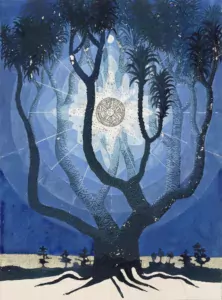 I received a sympathy card from a good friend after our only daughter, Elizabeth, died in 1998. The first time I read the card I wan’t sure I liked it, but I kept returning to it because it spoke to me somehow. I don’t remember the exact words but it started by saying that a tapestry is being created in eternity that represents the life of every human being.
I received a sympathy card from a good friend after our only daughter, Elizabeth, died in 1998. The first time I read the card I wan’t sure I liked it, but I kept returning to it because it spoke to me somehow. I don’t remember the exact words but it started by saying that a tapestry is being created in eternity that represents the life of every human being.
Each person’s tapestry is uniquely different. Some are dull and bland with little contrast. Other tapestries are more colorful but lack depth and contrast. Some of the tapestries are stunningly beautiful with lots of dark browns, grays and black interspersed with contrasting colors and even brilliant patches mixed in here and there.
These represent the life of someone who loved greatly (bright and colorful) and suffered greatly (dark shades and even black), without shutting down their heart. This allowed grace to illuminate and transform them (brilliant whites, silvers, and gold) into fully alive human beings. These are people who know that choosing to love comes with a price, but they choose to love anyway.
The path of transformation is different for each of us because we are unique individuals, yet there are only a few things in life that have the potential to transform us into persons grounded in our humanity and centered in the moment. The two biggies are experiencing great love or great suffering. These open our hearts in mysterious and paradoxical ways.
Having recently read a book on male psychology called He, by Robert Johnson, I thought of one other way that has the potential to open the hearts of men and transform us—memories of mystical experiences from our youth.
I wondered if the message on the sympathy card could be woven into our reflection at the King Archetype retreat to make the point that personal times of great love, great suffering, and moments of mystical experience are fertile grounds for personal growth and transformation.
I ran the idea by David, our weaver elder for the retreat, and he got excited, saying there was a loom at the Hermitage. We could hang it in the middle of our gathering space and have the men individually go up and choose fabrics with different colors and textures that would represent their personal experiences. It would revere and honor our experiences and ritualize them. We men especially need that for experiences to be realized in our psyche.
So that’s what we did.
To begin, I offered quotes from respected teachers such as Robert A. Johnson, Joan Chittester, James Finley, and Richard Rohr to validate that these events have tremendous potential for opening our hearts and for discovering our souls.
Here are some brief excerpts:
Most men remember a magic half hour sometime in their youth when the whole world glowed and showed a beauty not easily described…..No youth can cope with this opening of the heavens…. without being changed forever and yet we forget.—Robert A. Johnson
God is intimately hidden as a kind of profound, tender sweetness that flows and carries us along in the tragic thing itself—and will continue to do so every moment of our lives…—James Finley
Maturity comes from growing through every failure we have ever faced and becoming wiser than when we first began.—Joan Chittester
Any journey of great love or great suffering makes us go deeper into our faith and eventually into what can only be called universal truth. Love and suffering are finally the same, because those who love deeply are committing themselves to eventual suffering, as we see in Jesus.—Richard Rohr
After sharing longer versions of these quotes, I asked everybody to take a few minutes to reflect soulfully on a personal time of great love, a time of great suffering, and a mystical experience from their youth. As each man was ready, I invited them to carry the memories with reverence to the loom, select three ribbons of cloth that represented these transformative experiences, and weave them into the tapestry. The whole ritual was done in solemn and respectful silence.
After everyone had added their various colored fabrics to the loom we further honored our experiences by sharing them with the person sitting next to us.
There is something grounding and grace-filled about sharing our sacred stories with another human being. It requires trusting the listener, hoping that our words will be received without judgment. It requires a willing and mature person to receive our story gracefully. Once our experiences are remembered, honored, spoken, and received by another human being, a hidden wholeness is revealed that otherwise would remain veiled and hidden. In the process, we come to know that we are members of one body and indeed beloved sons of God.
Tom Pawlak





